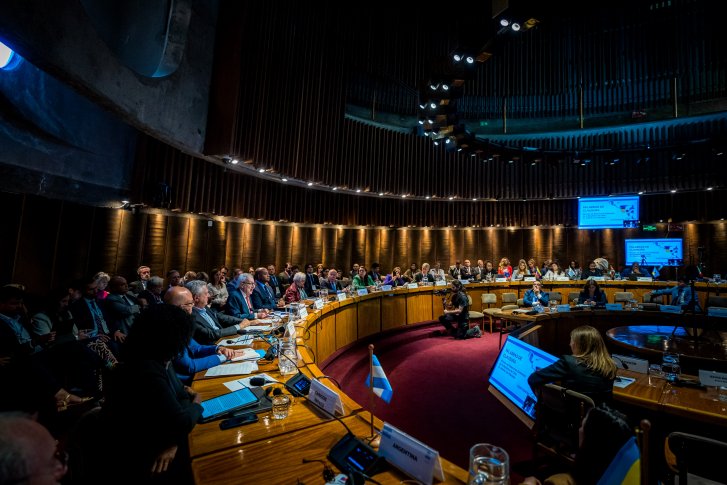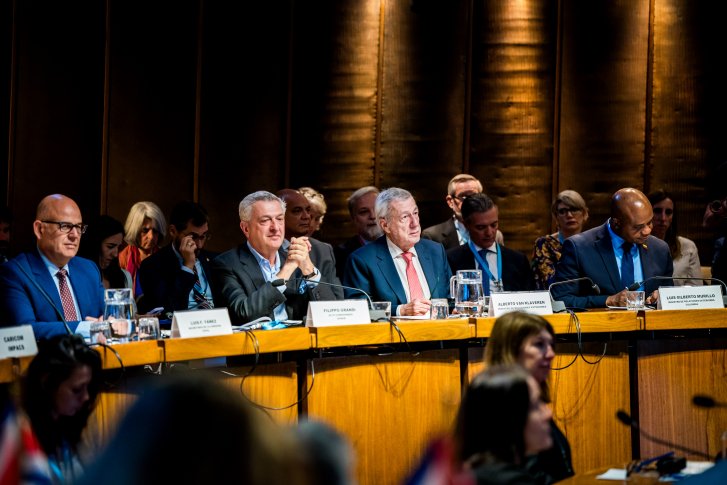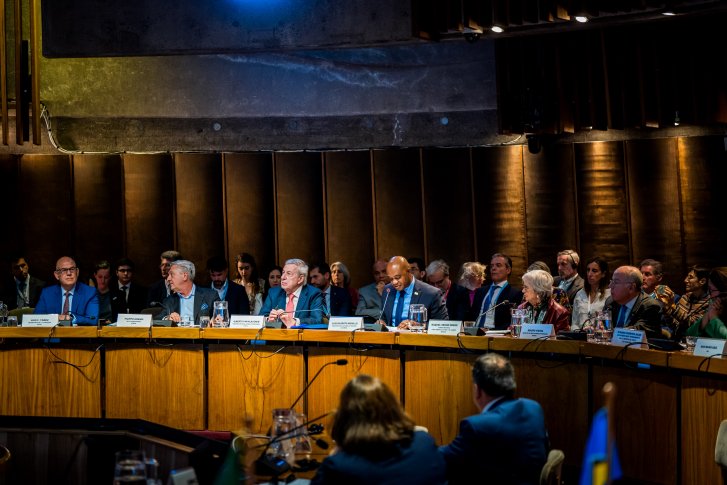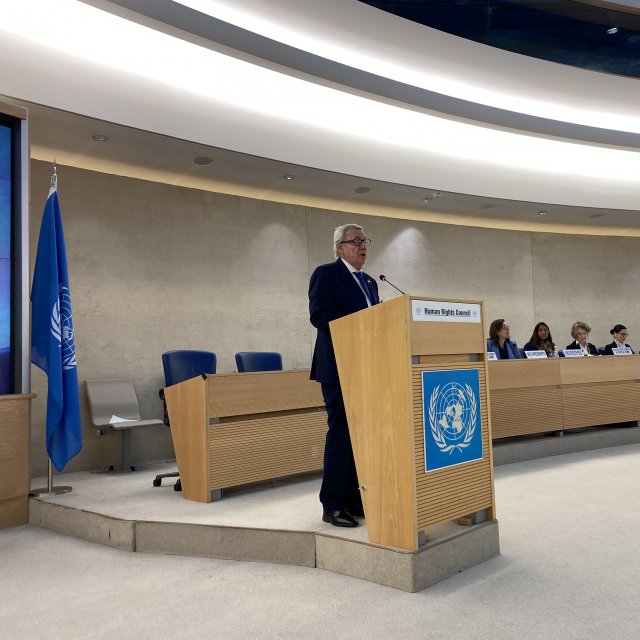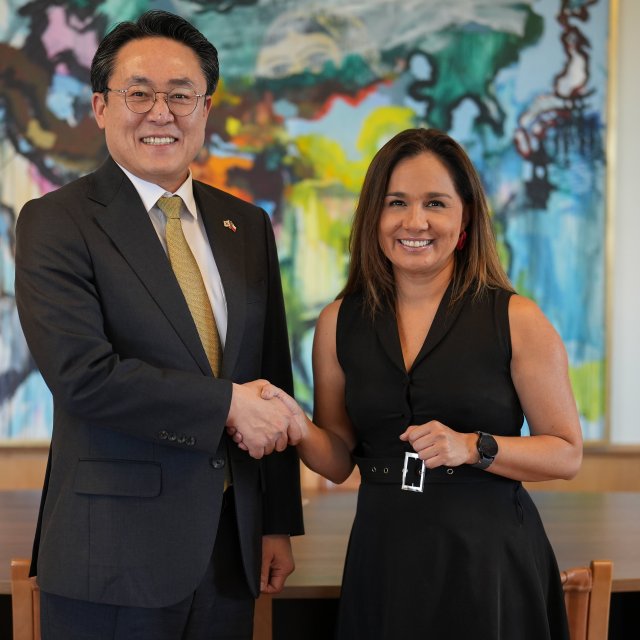 Thursday, February 27th 2025
Undersecretary meets with the Minister of Oceans and Fisheries of the Republic of Korea
Thursday, February 27th 2025
Undersecretary meets with the Minister of Oceans and Fisheries of the Republic of Korea
Chile's Declaration and Plan of Action consolidates Latin America and the Caribbean's leadership in the protection of refugees, the displaced and stateless persons

The countries of Latin America and the Caribbean renewed their commitment to solidarity, protection and the search for comprehensive, inclusive and sustainable solutions for refugees, displaced and stateless persons in the region by adopting the Chile Declaration and Plan of Action. This document marks the culmination of the celebrations for the 40th anniversary of the 1984 Cartagena Declaration on Refugees, one of the most relevant regional strategic frameworks for protection and solutions.
The Chile Declaration and Plan of Action will guide governments over the next decade through common responses to the challenges of refugee, displaced and stateless populations, considering the magnitude and complexity of forced displacement in the region and the realities of the countries of origin, transit, destination and return.
For Chile's Minister of Foreign Affairs, Alberto van Klaveren, “the process that is now ending sets out the path for the next decade, integrating innovative approaches to current challenges. While States have the primary responsibility to provide protection and solutions, we need coordinated efforts among multiple actors. Today, by adopting the Chile Declaration and Plan of Action, we reaffirm our commitment to face today's challenges and look to the future, upholding the Cartagena Process tradition of seeking innovative and strategic solutions for the protection and assistance of refugees, displaced and stateless persons in our region”.
The document proposes a comprehensive approach to the context of displacement caused by natural disasters; promotes formal employment through regional networks of solidarity enterprises; and promotes the use of advanced technology such as the digitalization of asylum systems and the use of biometric records to expedite refugee status determination procedures.
The recommendations for concrete actions are the result of participatory consultations held throughout 2024 with governments, organizations led by refugees and displaced persons, local authorities, civil society, national organizations for the promotion and protection of human rights, academia, international organizations, the private sector, and international development and finance actors, within the framework of the Cartagena +40 Process. These consultations addressed three key themes: protection of people in contexts of human mobility, inclusion and integration through sustainable solutions, and protection in contexts of disasters.
“The Cartagena process emphasizes the humanitarian and apolitical work that we do. I am convinced that many of the challenges that have arisen in the region with regard to refugees, displaced and stateless persons can only be addressed by taking into consideration the necessary coordination between global, regional and national efforts. This is the spirit of Cartagena that remains as relevant today as it was 40 years ago,” said Filippo Grandi, the United Nations High Commissioner for Refugees.
The Declaration and Plan of Action come at a challenging time for Latin America and the Caribbean, which face unprecedented levels of forced displacement, driven by causes such as persecution, violence, insecurity, inequality and lack of socioeconomic opportunities, aggravated by climate change and natural disasters.
At the same time, States and host communities have demonstrated solidarity and made significant progress in protecting, finding and implementing solutions. These actions will be strengthened through the various concrete actions proposed in the document.
In line with the 2018 Global Compact on Refugees, the Chile Declaration and Plan of Action involves multiple sectors of society under a comprehensive approach in all phases of displacement, with a human rights perspective based on shared responsibility, international cooperation and solidarity.
The Plan of Action seeks to strengthen the protection of refugees, displaced and stateless persons through improvements in identification, assistance and data collection systems; the technological modernization of asylum systems; the implementation of temporary regularization respectful of the right to asylum and the eradication of statelessness, respectively.
It also promotes access to basic services, employment, personal documentation and inclusive activities. It promotes the validation of qualifications, job training and the creation of employability networks with the participation of the private sector. It also promotes resettlement programs, family reunification and safe returns, fostering local integration in host countries and reintegration in countries of origin, as well as the active participation of host communities in the formulation of public policies.
For displaced persons in contexts of disasters and adverse effects of climate change, the new Plan of Action recommends the implementation of early warning systems, sound legal frameworks, planned evacuations and supportive strategies that integrate risk management and strengthen community resilience and adaptation.
Finally, this new regional framework establishes an innovative Follow-up and Coordination Mechanism for the Implementation of the Action Plan. This will be led by Chile over the next decade, with a rotating vice-presidency and the support of UNHCR (UN Refugee Agency) as Technical Secretariat. It includes governments, civil society and other key actors to coordinate and monitor actions, avoiding duplication and promoting regional harmonization. This approach seeks to ensure a flexible, efficient and sustainable implementation of the Plan of Action adopted today.
Considered a tool for implementing the 2018 Global Compact on Refugees in Latin America and the Caribbean, Chile's Declaration and Plan of Action urge the international community to support the efforts of host countries and other actors in the implementation of its programs and recommendations, further strengthening regional leadership in the protection and search for sustainable solutions for refugees, displaced and stateless persons.
Related articles
 Thursday, February 27th 2025
Undersecretary meets with the Minister of Oceans and Fisheries of the Republic of Korea
Thursday, February 27th 2025
Undersecretary meets with the Minister of Oceans and Fisheries of the Republic of Korea
 Monday, February 24th 2025
Minister van Klaveren reaffirms Chile's commitment to human rights and gender equality
Monday, February 24th 2025
Minister van Klaveren reaffirms Chile's commitment to human rights and gender equality







